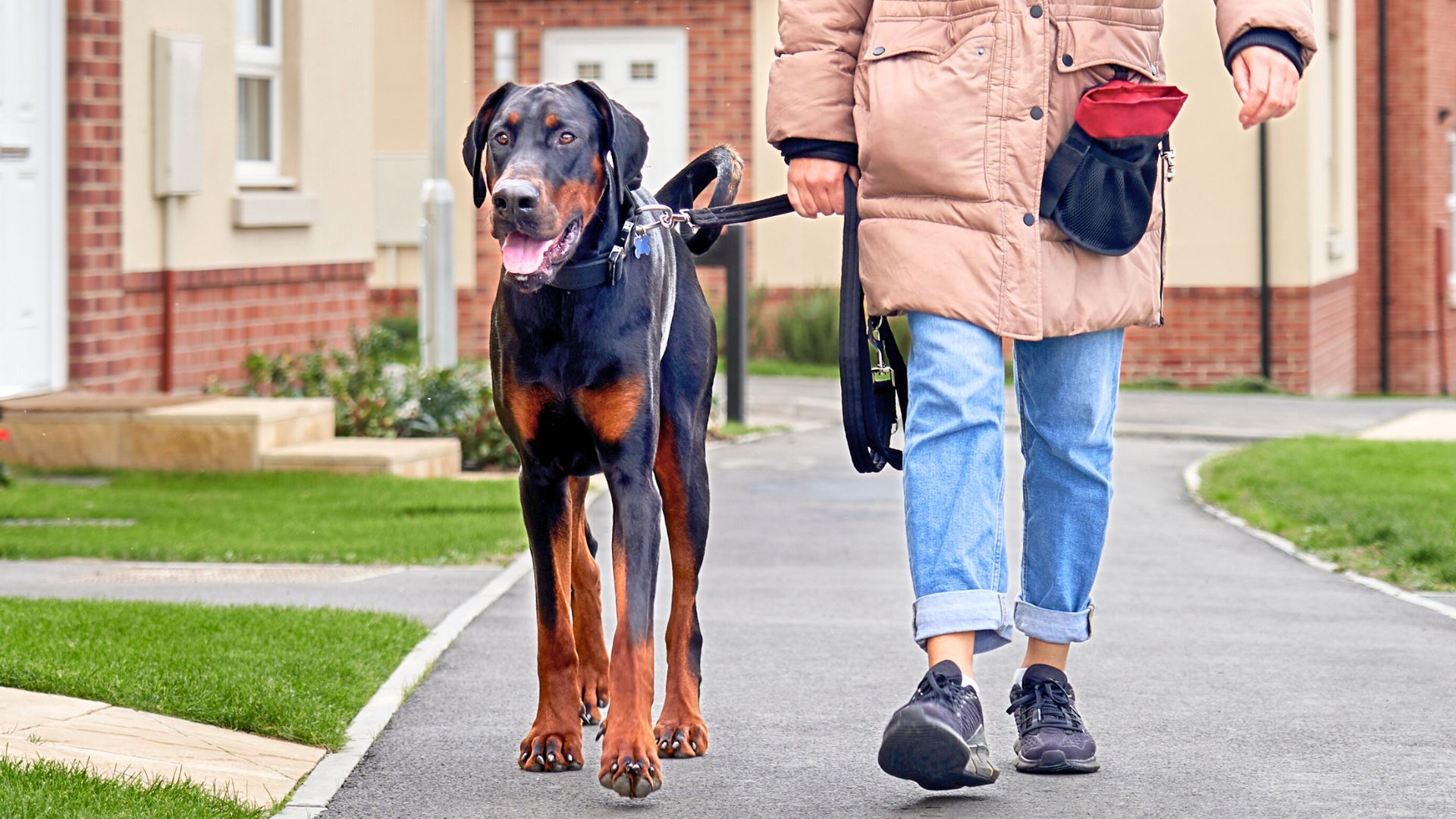WorldAnimalFoundation.org is reader-supported. When you buy through links on our site, we may earn an affiliate commission. Learn More
Did you know that the number of people choosing to live solo has skyrocketed from 7.9 million in 1980 to a whopping 16.2 million in 2020 in the US? It’s a clear sign that more of us are embracing independence, fueled by financial freedom and personal lifestyle choices. This shift also brings to light the importance of feeling secure in our own space.
Enter the trusty guard dog: the ultimate blend of a loyal friend and a personal bodyguard. Whether you’re cozied up at home or out for an evening stroll, a guard dog by your side means feeling safer and more protected. Beyond just security, these furry companions bring endless love, loyalty, and, of course, fun into your life. Who wouldn’t want that kind of company?
If you’re a young professional living alone and pondering over which dog breed could be your perfect match, worry not! We’re here to guide you through the best options for both protection and companionship.

Guard Dogs for Young Professionals Living Alone
1. Doberman Pinscher

Dobermans are super smart and perfect for young professionals looking for a bit more security. While they have a bit of a tough reputation, don’t let that fool you. These dogs are big softies at heart. With some good training and making new friends, Dobermans turn into devoted and fun-loving buddies. Just a heads-up, they love snuggling so much that they might hog your bed!
They’re clever, they always have your back, and they’re all about loyalty. Dobermans are natural protectors who are there for you, ready to stand up for their owners if the situation calls for it. They’re more welcoming to strangers than many other guard dog breeds, as long as their owner is okay with the guests.
According to Petplan, these energetic dogs need a good run around for at least 2 hours every day. They love learning new things, so keep those training sessions going. Dobermans do best with owners who know the drill and can spend the time to keep them happy and healthy.
2. Akita

Think of an Akita as your very own fluffy home security system. These dogs are not just alert and smart; their size and strength make them top-notch guard dogs for youngsters living independently. But it’s their big hearts and loyalty to their families that really power their protective instincts. Akitas can be a bit reserved around strangers, guests, and other pets, showing their bold and calm side when protecting their loved ones.
Getting your Akita used to meeting new furry friends from a young age is key. They’re naturally cautious around dogs they don’t know, so regular and lifelong socializing is a must to help them feel at ease.
PDSA points out that Akitas are busy bees who love a good run, thanks to their guarding and hunting roots. That love for the chase is still in their DNA, so when you’re out and about, keeping them on a leash is wise to prevent any unexpected sprints after squirrels. Daily exercise is non-negotiable for these dogs — a good two hours of activities will keep them happy and healthy.
Given their hunting history, Akitas have a strong prey drive. It’s wise to watch them around other animals, especially the smaller ones, as living with tiny pets might not be the best match for an Akita.
3. Bullmastiff

The Bullmastiff is a breed created for strength and guardianship, traits that strongly persist today. This dog is naturally protective, making it excellent for those living alone, as it is deeply loyal to its home and owner. While initially cautious around strangers, a Bullmastiff can warm up to them if its owner is accepting.
Their instinct to guard is powerful; they’re always watching over their territory and are ready to confront any perceived threats. The sight of their imposing size alone can deter unwanted visitors. Despite their willingness to follow commands, Bullmastiffs have a stubborn streak that requires careful management to avoid reinforcing unwanted behaviors. They’re typically calm and reserved but can assert themselves if they feel other dogs are encroaching on their space.
Bullmastiffs aren’t the most high-energy dogs but do need regular exercise to stay fit. They’re not ones for overly strenuous activities but enjoy a consistent exercise routine.
It’s important to note that Bullmastiffs might show aggression towards other animals, especially without early and ongoing socialization. This is a key consideration for potential owners to ensure a well-adjusted and sociable pet.
4. Rottweiler

Rottweilers, with their large size and imposing appearance, command respect as guard dogs. To those they call family, they are complete sweethearts, always ready to offer protection. This protective nature means they might eye visitors with suspicion, highlighting the importance of proper training.
The AKC points out that while Rottweilers have a tough reputation, being seen by some as fierce, they’re actually incredibly loving and gentle with the right training and socialization. Though they were bred for guarding, leading to a territorial nature, this doesn’t stop them from being affectionate family members.
Rottweilers are relatively low-maintenance for such large dogs. However, their love of food can lead to weight issues if not kept active. Their grooming needs are minimal, with just a quick brush weekly being enough to keep their coat in good condition.
5. Boxer

Boxers are the life of the party—smart, loyal, and brimming with joy. They’re the perfect companion for young folks living on their own, offering both friendship and a watchful eye. And they know how to balance work with play.
Thinking of a multi-pet household? Boxers get along well with cats, combining their tough exterior with a gentle nature to keep any unwelcome guests at bay. Their smarts and loyalty make training a breeze, ensuring they’re always ready to learn and please.
These dogs thrive on companionship, welcoming you home with boundless energy and affection. Boxers have a playful side and love engaging in fun activities, making every day a little brighter. They need regular exercise to burn off their energy, but their eagerness to learn makes training sessions enjoyable for both pets and owners.
6. Bouvier des Flandres

Bouviers des Flandres are known for their calm, level-headed, and protective demeanor, making them great companions and excellent guard dogs for young working peeps. They’re loyal and have a natural knack for learning commands quickly, although they prefer variety in training to avoid boredom.
According to Wikipedia, early and consistent socialization is key for Bouviers to ensure they’re well-adjusted and not too shy or reserved around new people. Their protective instinct is innate, safeguarding their family without needing specific training for it.
They’re keen to learn and respond well to training, coupled with their high energy levels, they fit perfectly in active households. Bouviers bark to a moderate degree and have a balanced need for mental stimulation, making them well-suited for families looking for a vigilant yet loving pet.
7. German Shepherd

German Shepherds are an excellent pick for young professionals. Known for their size and work ethic, they’re highly trainable with a bit of effort. Their stellar reputation as both guard and police dogs means they’re quite the deterrent for anyone thinking of intruding.
These dogs do need regular grooming, training, and attention, but in return, they offer years of devotion and companionship. They’re a great match for younger people, especially if brought into the home early on, giving them plenty of time to bond and train with their owner.
However, it’s important to be aware that German Shepherds have faced some health challenges recently. So, if you’re considering adding one to your family, doing a bit of research on their health background is a wise move to ensure a healthy, happy companion.
Conclusion
Guard dogs, originally bred for various protective roles like flock guardian breeds, make excellent companions for young professionals. Breeds like the Australian Shepherd, known for their intelligence and versatility, are great guard dogs that can adapt well to different lifestyles.
Starting training at an early age is crucial, especially for breeds with long coats, ensuring they not only look their best but are well-behaved and reliable protectors.




